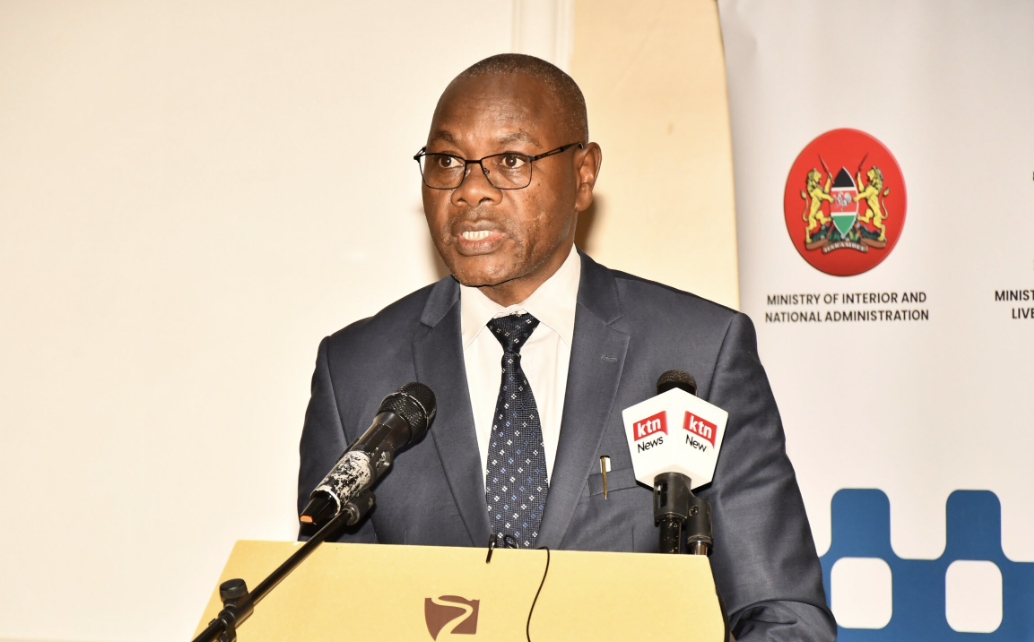
Food safety is not a slogan, it is a science, a commitment, and a shared responsibility, Dr Allan Azegele, Director of Veterinary Services has emphasised.
The chair of the Codex Alimentarius Commission, noted the crucial role that scientific knowledge and evidence play in ensuring the food we consume is safe.
He spoke during the 8th World Food Safety Day 2025. This year’s theme is, 'Food Safety: Science in Action'.
“Every time we prevent a foodborne illness, test for contaminants, or train a food handler, science is at work,” Azegele said. “Every safe plate of food served to a child, a patient, or a traveller is the result of science in action.”
World Food Safety Day is spearheaded by the World Health Organization (WHO) to raise awareness and reduce the global burden of foodborne diseases.
Azegele pointed out that Kenya’s food system relies on millions of smallholder farmers, food processors, vendors, and public health professionals, making a science-based approach vital at every stage from farm to fork.
“To make science relevant and real, we must adopt risk-based approaches to guide food safety decisions. This includes investing in laboratories, technologies, and data systems that can detect hazards before they escalate into crises,” he said.
He pointed out the importance of transforming Codex standards, which is built on science and global consensus into national policies that regulate food hygiene, labeling, and safety practices.
“Science must reach beyond the lab and into the public sphere. Food safety education must include not just experts, but consumers, traders, and schoolchildren,” he said.
“At the Codex Alimentarius Commission, our work is grounded in science, guided by evidence, and informed by inclusive dialogue. This is how we protect consumers and ensure fair food trade practices,” he added.
Azegele noted the importance of collaboration, adding that science alone is not enough and there is a need for partnerships, capacity building, and courage.
"That’s why the Codex community, together with FAO, WHO, Kenya Bureau of Standards (KEBS), the Ministry of Health, and others are committed to transforming science into action," he said.
He concluded by celebrating those working behind the scenes to keep food safe.
“Science makes food safe, but people make science work. Today, let us celebrate the inspectors, farmers, regulators, and innovators who safeguard our food supply,” said Azegele.
“Let us reaffirm our shared responsibility to use science not only in policies, but also in our markets, homes, schools, and farms. Let’s make food safety everyone’s business, driven by science, powered by action.”
Brendah Nakhumicha, Head, Division of Food Safety at the Ministry of Health said food safety has a critical role in assuring that food stays safe at every stage of the food chain.
This is from production to harvest, processing, storage, distribution, all the way to preparation and consumption.
It is estimated that 600 million people fall ill annually due to about 200 different types of foodborne illnesses. Foodborne illnesses are responsible for 420,000 preventable deaths annually translating to 40 percent of the foodborne disease burden, with 125 000 deaths every year.
"Unsafe food is a threat to human health and economies, disproportionately affecting vulnerable and marginalized people, especially on poor women and young children," said Nakhumicha.
"Embracing science to solve food safety concerns, generating information on what makes food unsafe and providing mitigation guidelines, is the direction to go."
She noted that this year’s theme particularly draws attention to the use of scientific knowledge as key to reducing food borne illness, cutting costs and saving lives.
Nakhumicha said the celebration aims to draw attention to scientific information to inspire actions that prevent, detect and manage foodborne risks.
"The resultant effects being to enhance food security, human health, economic
prosperity, agricultural market access, and sustainable development," she
said.
Ruth Okowa, Country Director, Global Alliance for Improved Nutrition (GAIN) Kenya confirmed that science plays a vital role in guiding efforts to reduce illness, cut costs, and save lives, making it a cornerstone of effective food safety systems.
For example, Kenya’s horticulture industry relies on national standards like KS 1758-2, which sets out sanitary and safety criteria for the production, handling, and sale of fruits and vegetables, to reduce contamination from farm to fork.
"But standards alone aren’t enough, they need buy-in, implementation, and consistent enforcement," she said.
Through its Vegetables for All project, GAIN is working with county governments and partners like KEPHIS and Crop Nuts to bring scientific tools closer to farmers and vendors. This includes training on good agricultural and handling practices, testing for Maximum Residue Levels (MRLs), and improving stall hygiene for last-mile vendors, especially mama mbogas who are a cornerstone of urban food supply.
"Food safety is everyone’s business. From policymakers to mama mbogas, from farmers to distributors, we all have a role to play in putting science into action to protect public health," said Okowa.
She urged the National and County Governments to prioritize and fund the implementation of food safety regulations, establish active food safety committees, and promote public awareness.
"Development partners should continue supporting training, testing, and policy implementation to close gaps in food safety. The private sector needs to adopt best practices across the supply chain and invest in traceability and quality assurance systems," she said.
"Through stronger partnerships, smarter policies, and a shared commitment to safer food systems, we can build a healthier, more resilient future for all," said Okowa.
"Science gives us the tools we must now ensure those tools are in the hands of every farmer, market vendor, every government official, and every kibanda cook," she concluded.















